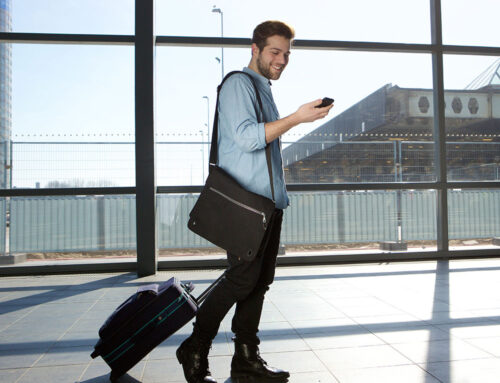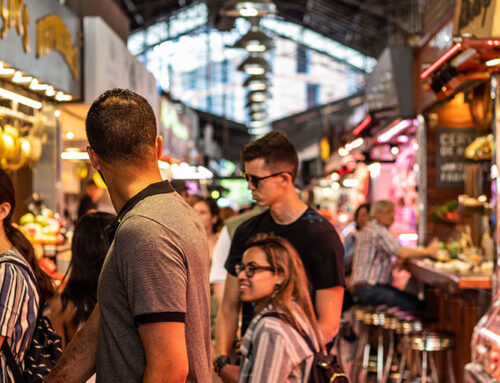Are you planning to travel soon and want to ensure not only your safety but the safety of your sensitive information and valuables? Visiting another country can be a great experience, but if you aren’t careful, it can be dangerous. It is essential to protect what you bring with you and to take travel security seriously. In this article, you will learn some general travel security tips that will help keep you, your information and data, safe while abroad.
Think About Security Before Reaching Your Destination
 When planning your trip, it is crucial to consider security before reaching your destination. Make sure to read recent news for situations that may impact your travel safety, like crime rates, weather conditions, or political unrest. It is always worthwhile to consult the State Department for current destination information. Make sure to research and be aware of any potential risks associated with the country and travel safety. In fact, as a general practice, the Federal Communications Commission recommends doing the following before travel:
When planning your trip, it is crucial to consider security before reaching your destination. Make sure to read recent news for situations that may impact your travel safety, like crime rates, weather conditions, or political unrest. It is always worthwhile to consult the State Department for current destination information. Make sure to research and be aware of any potential risks associated with the country and travel safety. In fact, as a general practice, the Federal Communications Commission recommends doing the following before travel:
- Back up your electronic files.
- Remove sensitive data.
- Install strong passwords.
- Confirm antivirus software is up to date.
In conjunction with these points, ensure that you have the necessary tools and devices to protect your information and valuables. Look into various clothing options that can help conceal your documents from pickpockets. Make sure your accommodations have a secure safe in the hotel room. Purchase a money bag. Also, downloading a travel security app with an emergency button is a good proactive measure and securing a translation assistance app. Both apps can provide recourse in the event you run into issues on the ground.
Make Copies of All Important Documents
As mentioned above, when traveling, it is vital to make copies of all essential documents, such as your passport, driver’s license, visa, insurance cards, immigration card information, and any other identification documents. Keep the originals safe on your person and keep the copies with you when you travel. Leave unnecessary items at home – ie, irrelevant credit cards. Limiting the scope of your possessions means you have fewer travel essentials to keep an eye on and fewer issues to remedy if you lose valuables during your travels.
Furthermore, make sure you have digital copies of your documents in case they are lost or stolen. Store these on an encrypted cloud site that will ensure easy personal access and necessary security. Keeping all of these documents in a safe and secure place will ensure that you have them whenever you need them.
Don’t Use Wi-Fi Networks
 Awareness of the potential risks of using public Wi-Fi networks is always important to securing your digital belongings. These networks are often insecure and can be used to access your personal information. Public Wi-Fi networks can also leave you vulnerable to hackers and cybercriminals.
Awareness of the potential risks of using public Wi-Fi networks is always important to securing your digital belongings. These networks are often insecure and can be used to access your personal information. Public Wi-Fi networks can also leave you vulnerable to hackers and cybercriminals.
It is essential to ensure that you always use a secure connection when accessing the internet. Purchase an international travel plan before leaving for your device. If you must use a public Wi-Fi network, then make sure you are using a Virtual Private Network (or VPN). A VPN will encrypt your data and protect your privacy. Additionally, be aware of the websites you visit and the information you share.
Handling Classified Information
When traveling for work, be aware of the potential risks of handling classified information. If you are traveling with sensitive information, make sure that you are aware of the security protocols in place. Additionally, do have the necessary tools and devices to protect your data? Strong encryption methods, a VPN as mentioned, and other forms of software security that limit access to your devices are all strongly recommended action steps. Typically, a job that requires you to handle classified information will brief you about rules for handling these documents ahead of travel. If you have doubts about anything or are not briefed, consult your immediate supervisor for guidance.
Most of all, when traveling with sensitive information, it is important to ensure that your devices are encrypted and secure. Remember that features on your devices, such as Bluetooth, can be remotely exploited, so hardening your security software on the devices you are taking is a must. You don’t want your camera to be used by someone else!
Be Aware of the Surroundings
When you are using your devices while traveling, maintaining a level of presence and situational awareness is always essential. Look out for individuals that seem to be too close for comfort or who are following you. Likewise, be aware of any scams or frauds that may be targeting travelers, such as pushy sales vendors or too-good-to-be-true tuk-tuk deals. Research what petty crime occurs in the areas you plan on traveling to, and as a rule of thumb, pack and dress as inconspicuously as you can. Drawing unnecessary attention to yourself is seldom a good idea. If you receive any suspicious calls or emails, report them to the local authorities, or activate the panic alert on your travel security app.
Don’t Use USB Charging Ports in Public Spaces
When traveling, it is vital to know the potential risks associated with using USB charging ports in public spaces. Using these ports can leave you vulnerable to hackers and cybercriminals. Additionally, be aware of the type of device you are using and its potential risks. For instance, some viruses are far more predominant on Android phones than on iPhone OS.
If you must use a USB charging port, make sure you use a secure adapter and cable. In short, the best option is to bring your own power sources with you, in the form of power adapters and external battery chargers.
Conclusion
Traveling can be a great experience, but it is important to take the necessary steps to ensure that you are safe and secure while abroad.
Before you embark on your journey, make sure that you are familiar with the risks associated with traveling and take the necessary steps mentioned in this article to stay safe. With the proper preparation and knowledge, you can ensure that you (and your belongings) are safe and secure while traveling, wherever you go. Remember, the best security strategy is one of proactive security – think before you leap!

